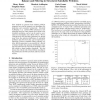Free Online Productivity Tools
i2Speak
i2Symbol
i2OCR
iTex2Img
iWeb2Print
iWeb2Shot
i2Type
iPdf2Split
iPdf2Merge
i2Bopomofo
i2Arabic
i2Style
i2Image
i2PDF
iLatex2Rtf
Sci2ools
131
click to vote
IJCAI
2001
2001
Balance and Filtering in Structured Satisfiable Problems
New methods to generate hard random problem instances have driven progress on algorithms for deduction and constraint satisfaction. Recently Achlioptas et al. (AAAI 2000) introduced a new generator based on Latin squares that creates only satisfiable problems, and so can be used to accurately test incomplete (one sided) solvers. We investigate how this and other generators are biased away from the uniform distribution of satisfiable problems and show how they can be improved by imposing a balance condition. More generally, we show that the generator is one member of a family of related models that generate distributions ranging from ones that are everywhere tractable to ones that exhibit a sharp hardness threshold. We also discuss the critical role of the problem encoding in the performance of both systematic and local search solvers.
IJCAI 2001 | IJCAI 2007 | Random Problem Instances | Satisfiable Problems | Sharp Hardness Threshold |
Related Content
| Added | 31 Oct 2010 |
| Updated | 31 Oct 2010 |
| Type | Conference |
| Year | 2001 |
| Where | IJCAI |
| Authors | Henry A. Kautz, Yongshao Ruan, Dimitris Achlioptas, Carla P. Gomes, Bart Selman, Mark E. Stickel |
Comments (0)

